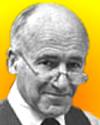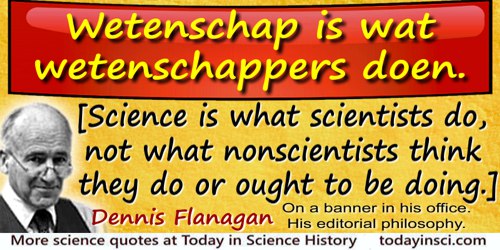 (source)
(source)
|
Dennis Flanagan
(22 Jul 1919 - 14 Jan 2005)
American editor who steered the Scientific American for 37 years (1947-84) and established a new style for the magazine of inviting scientists to write its articles, with support from an editor and illustrator, aimed at the general reader. He rescued the magazine in the post WW II years when it was floundering. With partners and investors
|
Science Quotes by Dennis Flanagan (5 quotes)
Although such research [into the paranormal] has yet to produce anything in the way of a repeatable controlled experiment, its practitioners argue that its revolutionary potentialities justify its continuation. My own feeling is that after a century of total failure it has become a bloody bore.
— Dennis Flanagan
In Flanagan's View: A Spectator's Guide to Science on the Eve of the 21st Century (1988), 152.
If tombstones were still in style, I would want to have the two words [“Renaissance hack”] chiseled right under my name.
— Dennis Flanagan
In an encounter Flanagan had with The New Yorker film critic, Pauline Kael, she claimed to knew nothing about science. He gently scolded her. Kael responded with the genial retort: “Oh, you're a Renaissance hack,” a description which pleased him. Recounted in Flanagan's Version: A Spectator's Guide to Science on the Eve of the 21st Century (1988), 3.
In an age of specialization people are proud to be able to do one thing well, but if that is all they know about, they are missing out on much else life has to offer.
— Dennis Flanagan
As given in John Rennie, 'Dennis Flanagan, A Proud “Renaissance Hack”', Scientific American (26 Jan 2005).
It is easy to make out three areas where scientists will be concentrating their efforts in the coming decades. One is in physics, where leading theorists are striving, with the help of experimentalists, to devise a single mathematical theory that embraces all the basic phenomena of matter and energy. The other two are in biology. Biologists—and the rest of us too—would like to know how the brain works and how a single cell, the fertilized egg cell, develops into an entire organism
— Dennis Flanagan
Article 'The View From Mars', in Annals of the New York Academy of Sciences: Research Facilities of the Future (1994), 735, 37.
Science is what scientists do, not what nonscientists think they do or ought to be doing.
Wetenschap is wat wetenschappers doen.
Wetenschap is wat wetenschappers doen.
— Dennis Flanagan
Flanagan's motto as magazine editor for selecting content to put in Scientific American. Because he heard, and liked the sound of this slogan in Dutch, he put that version on a banner in his office. As quoted in obituary by Marc Santora, 'Dennis Flanagan, 85, Editor of Scientific American, for 37 Years', New york Times (17 Jan 2005), B6.
See also:
- 22 Jul - short biography, births, deaths and events on date of Flanagan's birth.
- Flanagan's Version: A Spectator's Guide to Science on the Eve of the 21st Century, by Dennis Flanagan. - book suggestion.


 In science it often happens that scientists say, 'You know that's a really good argument; my position is mistaken,' and then they would actually change their minds and you never hear that old view from them again. They really do it. It doesn't happen as often as it should, because scientists are human and change is sometimes painful. But it happens every day. I cannot recall the last time something like that happened in politics or religion.
(1987) --
In science it often happens that scientists say, 'You know that's a really good argument; my position is mistaken,' and then they would actually change their minds and you never hear that old view from them again. They really do it. It doesn't happen as often as it should, because scientists are human and change is sometimes painful. But it happens every day. I cannot recall the last time something like that happened in politics or religion.
(1987) -- 


